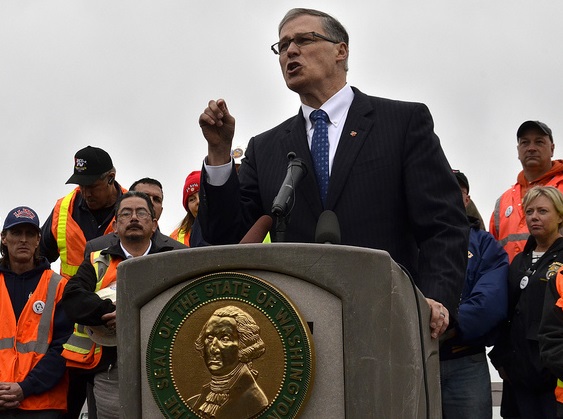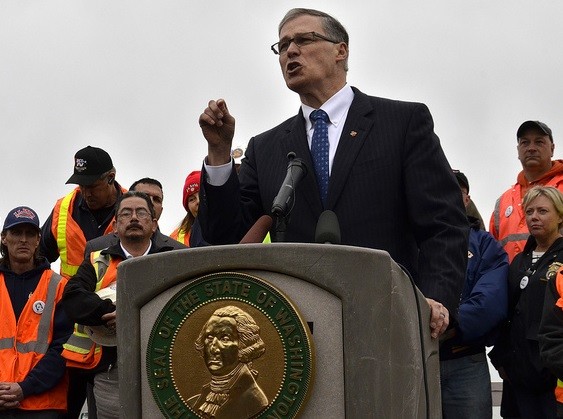Washington’s Governor Jay Inslee, stymied by Republican opposition to putting a price on carbon, is flexing his executive power. Like President Obama using his Clean Air Act authority to order the Environmental Protection Agency to formulate the federal Clean Power Plan, Governor Inslee has invoked his authority under existing pollution laws. Last year, a group of Washington young people petitioned the Department of Ecology to use its existing authority to take action on climate change.
In July, Governor Inslee ordered the Washington Department of Ecology to make a plan that will cut climate pollution down to the limits in state law.
Ecology’s rulemaking could:
1. Create a plan and some policies to start Washington down the right path until the legislature takes action.
By using his executive authority, Governor Inslee might be able to keep Washington on track, despite this year’s legislative gridlock.
Comprehensive climate action requires comprehensive public process. California took two years of public rulemaking to develop its “Scoping Plan”—the blueprint for the state’s climate action. Governor Inslee directed Ecology to conduct a one-year rulemaking where “all stakeholders will have ample opportunity to express their ideas, options and concerns as the rule development process unfolds.” Ecology will “assess which sectors and facilities should be covered” and will offer a “variety of compliance options” for those facilities and sectors.
This rulemaking could result in a sweeping state plan describing policies aimed at overcoming market barriers to cutting pollution, policies aimed at sectors that would not likely be included in a cap-and-trade program, and policies aimed at achieving additional benefits, beyond reductions in greenhouse gas emissions.
With this plan in hand, the Evergreen State will be two steps down the path to climate action.
First, by holding a public rulemaking and writing a rule now, the agency will be able to quickly implement a climate bill once the legislature passes one. By having Ecology create a plan by summer 2016, Inslee could cut an entire year off the implementation schedule of a future carbon cap law.
Second, the agency can start portioning out chunks of a bigger climate package. For example, Washington might implement policies to reduce high global warming potential gases like sulfur hexafluoride and hydroflourocarbons by limiting their use in applications where there are safe and cost-effective alternatives. Or it might find a way to ensure vehicle tires are inflated to manufacturer specifications, maximizing vehicle efficiency. Once the legislature enacts a comprehensive statewide program, some pieces will already be in place.
2. Start the public vetting process for a carbon cap.
The governor’s July 28th statement and his August 13th letter to Ecology dance around the issue of cap-and-trade. Governor Inslee directs Ecology to create a “regulatory cap” on climate emissions, possibly including “credits” and “trading.” Inslee stops short of ordering Ecology to develop a cap-and-trade as part of its rule.
But the rule could make a start on it. Ecology may not be able to implement a full cap-and-trade program, but the agency could move forward on critical questions such as choosing which facilities should be covered, identifying energy-intensive trade-exposed businesses, putting in place reporting and verification standards, deciding how to track allowances, and developing guidelines for acceptable offsets. By holding a public process, Ecology will get a head start on sussing out concerns and crafting policy responses.
3. Prompt businesses and their legislative champions to push for a price.
Businesses in Washington state, across the United States, and around the world are urging governments to act on climate change. Unfortunately, the “just regulate them” approach is more complicated and more expensive than a policy with a price at its center. Faced with the prospect of complying with a suite of more heavy-handed regulations, climate-conscious businesses in Washington might step up their efforts, and businesses that have so far stayed on the sidelines might join the fray to convince the legislature to enact a statewide or region-wide price.
A rulemaking is a start, but Washington needs legislative action.
Governor Inslee and the Washington legislature are engaged in a game of climate chess, and the Governor just made an important move. Legislature: you’re up soon.










Don Graham
In 2009, Puget Sound had the dubious distinction of being designated one of the two most “Poisoned Waters” in the USA. Has Governor Inslee made any effective progress in his detoxification efforts of our part of the Salish Sea?
richard pauli
Um…Do you Sightline researchers ever talk to each other? Yesterday I read about a methanol pipeline moving through the state to Washington ports and then on to China. Did you overlooked that? Why would Governor Inslee permit such a vast carbon emission project?
Your Inslee Carbon Love Fest falls flat. Cross the room and talk with Eric de Place and his post “What Methanol Means for the Northwest A look at China’s plans for three big export refineries.”
Al Bergstein
Don, you should check out the Puget Sound Partnership’s web site. It has a number of indicators that show progress or lack of progress on a number of fronts. Governor Inslee has been a supporter of funding the Partnership, and pushing for more Federal dollars to do the work of cleanup, which is where the money should come from, since it’s too costly to do all this ourselves.. it is an aggravatingly slow process, and the Partnership is far from perfect, but money is allocated to the tasks every year, and many of us out here in the field do see that money and it helps us get work done. So other than allocating more money, which is not going to happen with the current makeup of both the State and Federal governments. Please feel free to come out to any of the work sites (some are volunteer driven so you could participate).
As to the Governor’s stand on the methanol pipeline, he apparently sees it as part of a transition away from traditional fossil fuels to somewhat more cleaner sources. An article in August 17, 2015 in Siteline stated: “In a spring 2014 newsletter, the Port boasted about the project creating 1,000 construction jobs during the three year build-out of the site plus 200 ongoing jobs during operations, as well as reducing carbon emissions by producing methanol from natural gas, rather than from petroleum and coal” And it appears that the pipelines being built are short extensions to existing ones. One is only about 3 miles long. While the governor’s stance is not ideal from a pure environmentalist point of view, it does have some basis in a position that does reduce petroleum and coal usage. To me, that’s a positive step.